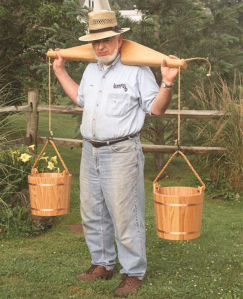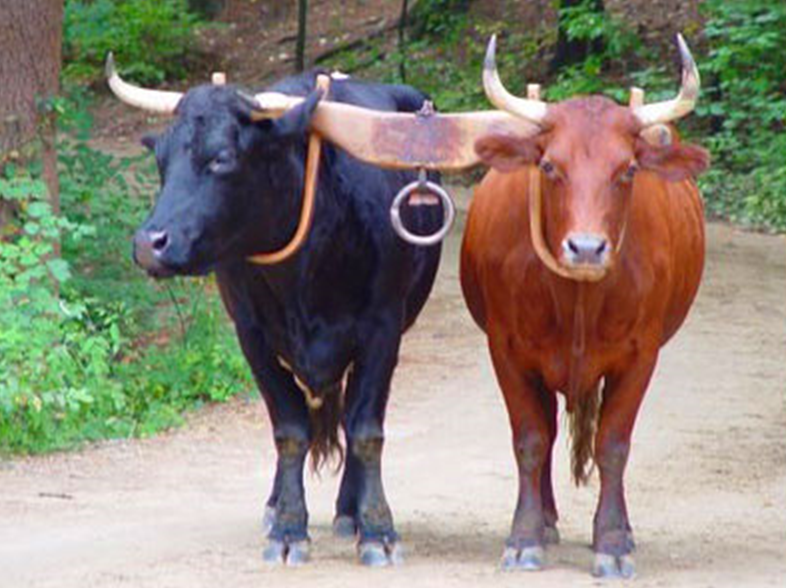28Come to me, all who labor and are heavy laden and I will give you rest. 29Take my yoke upon you, and learn from me, for I am gentle and lowly in heart and you will find rest for your souls. 30For my yoke is easy, and my burden is light.
But, in this passage Jesus is talking about human yokes, ones that go across your shoulders to carry heavy things. They’re meant to enable you to carry more weight and get more work done.

This one’s actually for sale, made by an Amish craftsman, if you’re interested. Wives maybe this can help your husbands with chores around the house? Christmas is just around the corner.
A yoke like this is described in Jeremiah 27:2 where it says, “make yourselves straps and yoke-bars and put them on your neck.”
Now, this kind of yoke is often used metaphorically in a negative way to speak of being in subjection to someone.
- In our verse from Jeremiah that we just read it refers to Judah being subjected to the Babylonian empire after being defeated and carried off to exile.
- And in the New Testament it’s used to refer to slavery in 1 Timothy 6:1.
But in Jewish thinking a yoke can also be used in a more positive way to speak of walking in God’s ways; the yoke of obedience and service to God. (Jeremiah 5:5; Sirach 51:26; m. Abot 3:5). In our passage we have both – a bad yoke that’s too heavy and a good yoke that’s light.
I believe this morning that –
Many of us are weary from our yokes and carrying heavy burdens
Jesus talks of “all who labor and are heavy laden” – v. 28
- The first word “labor” has to do with hard work and also the weariness that comes from it.
- The phrase “heavy laden” can also be translated as “burdened.”
So the image is of a person with a yoke on, but the load is really heavy and it takes a lot of work just to move around. Think of the picture we just saw of the man wearing a shoulder yoke and imagine the two buckets as bigger and loaded down with heavy rocks. So much so that the man is bowed over with the weight. That’s what we’re talking about here.
Jesus mentions “rest for your souls” in v. 29. So here we have the opposite, which would be soul weariness. Your inner person is weighed down, tired, exhausted and maybe even ready to give up.
Now, when Jesus talks about heavy burdens, he is certainly talking here about the traditions of the elders which the Pharisees added to what God’s will is for our lives. Jesus talks about this in Matthew 23:4, where he says, “they tie up heavy burdens, hard to bear and lay them on people’s shoulders.” (Talking about a shoulder yoke here also)
These heavy burdens are rules about how far you can walk on a Sabbath, rules about healing on the Sabbath and on and on (see the stories that come right after our verses.) You name the activity in life and there were rules for it; lots of them. Rules, rules, rules. And this is the important part – rules that went beyond what God’s will was for his people, which the Pharisees said you had to follow to be accepted.
Well, Jesus rejected these traditions of the Elders as we see in Matthew 15:6. Jesus doesn’t load us down with a host of human rules; things that go beyond God’s will for our lives.
Maybe you’re carrying a yoke today of human rules and expectations that are not God’s will for you.
- Maybe rules that other Christians have thought up about how to worship and serve God that go beyond Scripture. Christians are good at making up extra rules too.
- Maybe they are other kinds of expectations for your life that others – family or friends impose on you – that have nothing to do with what God has called you to do.
And you’re here this morning and you’re tired of it. You’re tired of being subjected to carrying these heavy burdens around. Jesus is talking to you today in this passage!
There are other yokes and burdens – for instance there’s the yoke of slavery to Sin (John 8:34; Romans 6:16-20). This is where we live our lives apart from God’s will, doing our own thing, going along with the world and our friends.
But sin, once chosen, becomes our master. It comes to control us and it begins to ruin our lives because sin is powerful and brings misery and then death.
And you’re here this morning and you’re sick of all this – you’re tired of the burdens of sin – the shame, the guilt. You’re tired of disappointing and hurting others and God, but you can’t break free. You have a yoke on. Jesus is talking to you right now!
Maybe the yoke you’re carrying today is just the weights and cares of the world.
You’re overwhelmed with life, right? It’s easy to be this way with all that’s going on – Covid 19, politics, financial struggles, relationship struggles, worries about the future. You’ve got the weight of the world on your shoulders.
Well, whatever may be weighing you down –
Jesus invites us to come to him and find rest
He says, 1. “Come to me” – v. 28. Jesus is the solution. He’s the one who can fix our burdens and our weariness. And he invites each one of us to come. He says, “Come to me all” who labor and are heavy laden.
What do we do when we come to Jesus? We lay down our heavy burdens and invites us, 2. “Take my yoke upon you, and learn from me” – v. 29.
As I said, in Jewish thought, doing God’s will was seen as a yoke. And here Jesus offers his teaching and example as the new yoke to put on our shoulders. To take on Jesus’ yoke is to live your life according to what he has for you.
- Not doing more than this by adding on extra human rules – we lay that burden down.
- Not being slaves to our sins – in repentance we set these aside.
- Not carrying the weight of the world on our shoulders all the time – we give these into God’s hands to take care of.
We simply take on Jesus’ yoke of walking in God’s ways. We become disciples of Jesus. The word “learn” here is from the same word as the word “disciple.” We become students of Jesus. We study his teaching and example and we do what he says and models for us.
And what we’ll find is that Jesus is a kind master. He said, 3. “For I am gentle and lowly in heart” – v. 29.
The word “gentle” is really meek or lowly. The second word here, “lowly” can also be translated as humble in heart.
Jesus is not a slave driver. Indeed, he himself came and walked this earth as a servant. And he knows that being in charge means serving others, not lording it over them (Matthew 20:25-28). He is kind and humble with us.
And we will also find that Jesus’ yoke is just right for each of us. He said, 4. “For my yoke is easy and my burden is light” – v. 30.
- “Easy” is probably better translated as “comfortable,” or a yoke that fits just right. Not one that digs in or causes pain. According to the testimony of one early Christian, who was raised near Galilee not long after the time of the apostles, Jesus “was in the habit of working as a carpenter when among men, making ploughs and yokes.” (Justin Martyr, Dialogue with Trypho, 88). And so he would know about making a comfortable yoke.
- “Light” has to do with having little weight. Not being overloaded and weighed down.
Now none of this means that following Jesus can’t be hard. It can be at times. But in comparison to being weighed down under human rules and expectations or slavery to sin or carrying the weight of the world on our shoulders — it is truly a comfortable yoke and a light weight.
And finally, because we come to Jesus, and lay down our false burdens and take up his yoke, Jesus says, 5. “I will give you rest” – v. 28. And, “you will find rest for your souls” – v. 29.
Rest here means the cessation of toilsome labor from carrying really heavy weights that we were not meant to bear. It means peace, wholeness and well- being, which comes from following Jesus and walking in God’s ways. (Jeremiah 6:16).
This rest is connected to the Sabbath rest and how this foreshadows the rest we will have when the kingdom comes in its fullness. (Again, see the stories on the Sabbath that follow our text.)
And we have this rest deep in our hearts and souls; in our inner person.
I invite you this morning to come to Jesus and find rest. As I pray, picture yourself laying down your false yoke and only taking up what he has for you.
“Jesus help us to lay our burdens at your feet and only carry what you have for us; your will for our lives. And bless each one of us with the rest you promise here – relief from weariness, peace, new life, new energy, new strength and new hope.”
